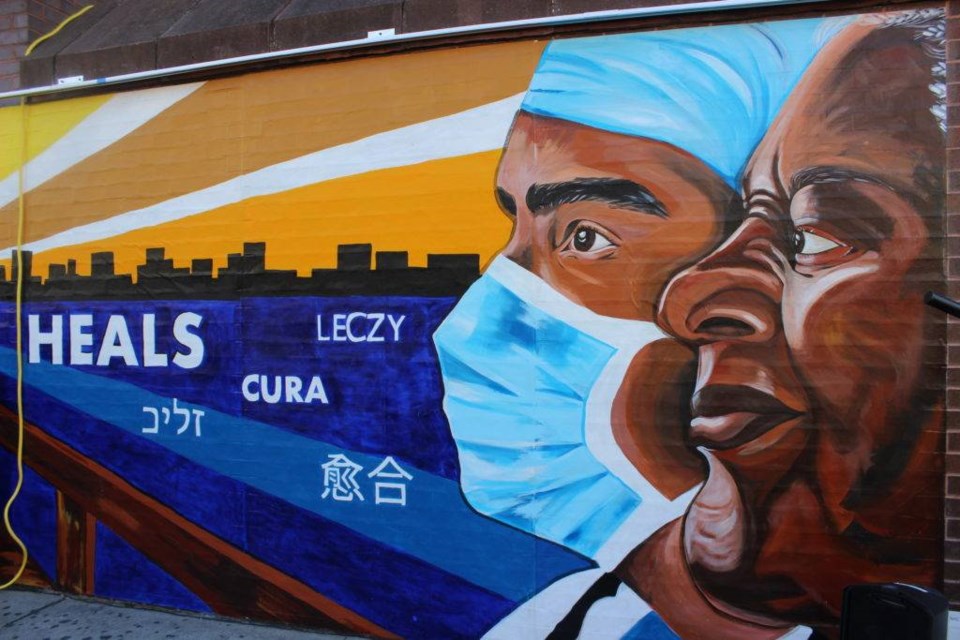Over the last five days, more than 1 million Americans have been infected with COVID-19.
The staggering number shows the alarming rate the virus is still spreading, having overtaken the levels we saw it spreading earlier this year. Although a vaccine is already in use, with a second likely to be approved Friday afternoon, the winter is expected to be a dark period in the country's public health history with hospitals across a number of states already reaching capacity and deaths rates climbing rapidly.
On Thursday, at least 3,293 died from the virus ad there were 238,189 new cases of COVID-19 reported in United States. It brings the total number of people who have been infected in the country to more than 17,256,100.
By Friday the United States had surpassed 311,230 deaths.
Over the past two weeks, the daily average of positive cases has increased by 18% to 213,165 as the virus continues to ravage the country and break new records in case numbers and hospitalizations.
Health care systems "are verging on the edge of breaking," Dr. Michael Osterholm, a member of President-elect Joseph R. Biden Jr.'s Covid-19 advisory council, said in a podcast this month.
It is predicted that the hospital systems in a number of states will be overloaded by Christmas Day. In California, I.C.Us only have 3% of their beds available to new patients. In New York, more than five hospitals are above 75% capacity; and in Brooklyn, New York Presbyterian Brooklyn Methodist Hospital is at 121% capacity, data from the U.S. Department of Health and Human Services shows.
The U.S. has recorded more cases than any other country and with the virus at unseen heights states are implementing new lockdown measures to try and control the surge before widespread vaccination is achieved. Experts have said the country could reach more than 400,000 coronavirus deaths before February.
On Thursday, Vice President Mike Pence publicly received his COVID-19 vaccine in a show of public confidence. The speed and politicization of the vaccine's development has led many Americans to be skeptical of its effects, and the lack of public information campaigning from federal, state and local governments has been criticized for not helping to provide the facts around the vaccine.
The Pfizer vaccine became the first to be authorized in the country, and in the first 72 hours 5,200 New York City health care workers received the first of two doses. The rollout has been somewhat slow with health care workers, nursing home residents and essential workers first in line for the vaccine. Widespread distribution isn't expected for months.
The U.S. isn't the only country dealing with a surge in the virus, after a rush to reopen Europe is seeing a second wave hit hard and countries have implemented strict lockdowns to bring the virus under control. French President Emmanuel Macron announced he had contracted the virus on Thursday and was said to be slowed down by its effects.
The global death toll from the virus is 1,667,124 and in the United States more than 311,230 people have died.

National:
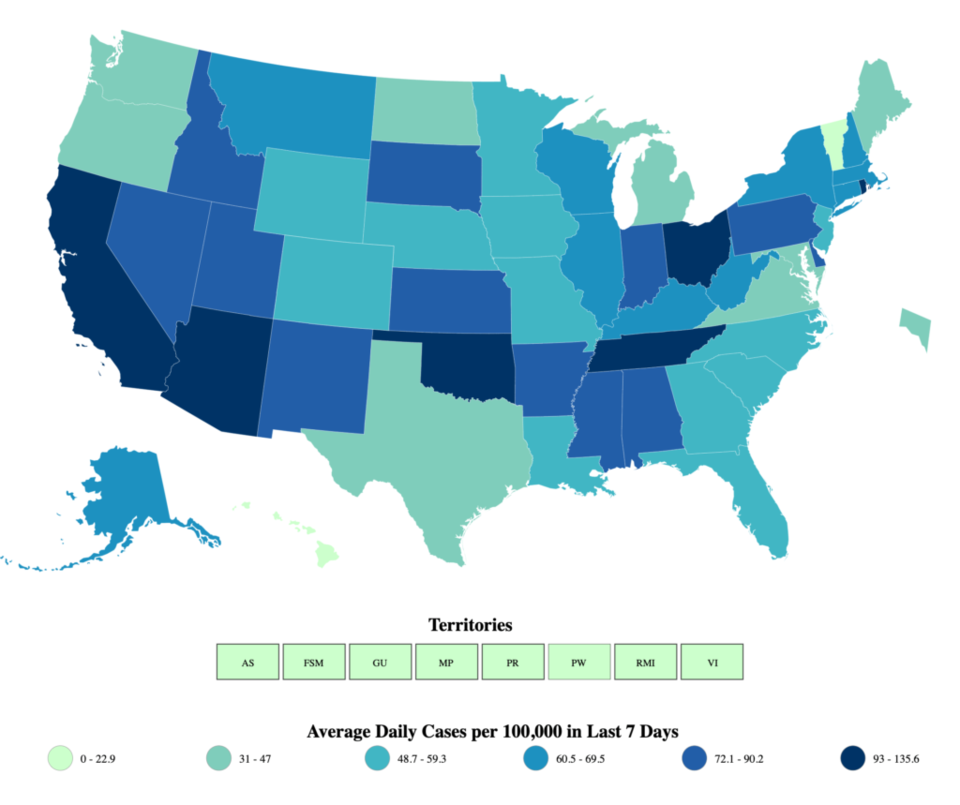
Total cases as of December 18, 2020:
- On Friday, infections in the U.S. were at 17,243,580 as the country continues to shatter national and global records, highlighting the virus shows no signs of slowing down. On average, 213,165 people have been infected each day this week.
- As of Friday, more than 17,256,100 have been infected with the coronavirus nationwide and at least 311,230 have died.
- In a sign of hope in the battle against the virus, a vaccine developed by Pfizer has already been approved in the U.S. and thousands of healthcare workers have already been vaccinated.
- Moderna's vaccine is expected to be authorized by the FDA Friday and afternoon and Johnson & Johnson is about to head into phase three of clinical trials for its vaccine. The more vaccines on the market means it will be easier for Americans, and everyone globally, to get access.
- There are more than 114,237 hospitalized across the country as ICUs and hospital wards buckle under the strain of the virus, according to the Covid Tracking Project, something that is only expected to get worse.
- Over the past week, deaths have climbed to more than 3,400 per day reaching heights not seen during the first wave of the pandemic earlier this year.
- Pandemic induced state and city budgets cuts are severely affecting communities across the country, as many leaders call on the federal government for aid. Republican Senator Mitch McConnell and Democratic Senator Nancy Pelosi have said they are close to reaching an agreement on a second coronavirus relief package to distribute to American citizens before Christmas term is over.
- Large scale food and housing insecurity has taken hold across much of the country. There is a national eviction moratorium in place until December 31, to protect people nationwide from homelessness. But there are still a number of reports of evictionstaking place across the country, despite their illegality.
- The Salvation Army is predicting 6.6 million people will come to the organization for help this holiday season, up from the regular 2.6 million, and officials have said they are worried they won't be able to meet demand.
- In state and federal prisons, one in every five inmates have tested positive for COVID-19 — a rate over four times higher than those in the general population. At least 1,800 inmates have died from COVID-19.
- In nursing homes, more than 788,000 residents and staff have been infected and more than 106,000 have died — accounting for more than 35% of the country's virus deaths.
NYC:
On Thursday Dec. 17, there were 125 deaths in New York State and 10,498 new cases.
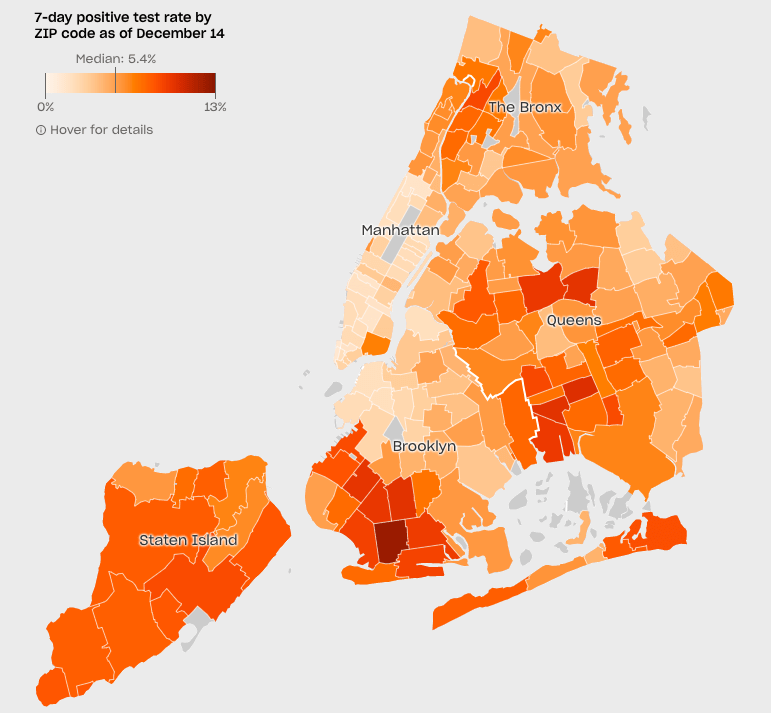
As of Friday Dec. 18, in New York City there have been 373,086 confirmed COVID-19 cases in New York City, and 24,538 deaths.
In the state that those numbers are 815,469 cases and 28,222 according to a New York Times database. The 7-day positivity average is 4.93% and over the last 7 days there has been 16,470 new cases, according to city data.
New York State has started distributing the 87,000 doses of the Pfizer vaccine it order, and this week a New York City nurse became the first in the country to be immunized. Healthcare workers, nursing home residents and staff and essential workers are first in line for vaccinations. The general population will most likely not be vaccinated until early-mid 2021.
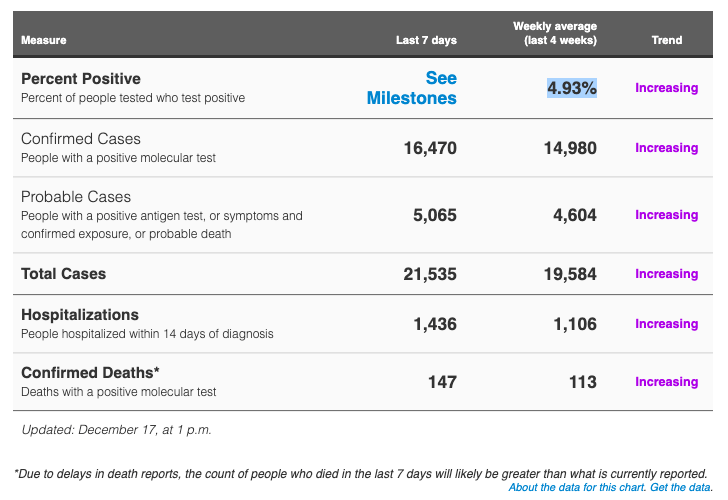
As cases increase and positivity rates rise across the city, indoor dining has been halted in a major blow to restaurants, who have received no federal, state or city help since the initial stimulus package. Even then, many restaurants did not receive a PPP loan.
Leaders are urging New Yorkers to avoid gatherings, wear masks and be vigilant in taking measures to avoid the virus amidst the holiday season.
More than 2,000 inmates in New York prisons have tested positive for COVID-19, leading The Legal Aid Society to file a lawsuit against the Department of Correction and Community Supervision to get the department to release COVID-19 infection data in state prisons.
Although there are no longer any red zones in NYC, extra restrictions remain in place in certain neighborhoods coded yellow or orange across the city and state where cases are spiking. To read what restrictions are in place in each zone, click here.
The NYC Health Department released these guidelines:
- All New Yorkers should continue to follow the Core 4: wear a face covering, practice proper hand hygiene, maintain safe physical distance from others, and stay home if you are sick.
- Get tested! All New Yorkers should get tested whether or not they have symptoms. Tests are free. Find a testing site near you.
- Worship safely: Avoid large gatherings, especially indoors. If your house of worship has reopened, wear a face covering, don't share chalices or utensils and avoid close contact with others including hand shaking and hugging — wave instead. If you're singing, you must stay at least 12 feet apart from others.
- As we begin a return to activities like dining outand shopping, it is essential that we continue to take steps to prevent transmission of COVID-19.
State Health Commissioner Dr. Howard Zucker recently said there was still a lot we don't know about long-term effects of the virus, including the experiences of "long-haulers" reported recently in the New York Times. It seems the virus can have frightening long-term effects, including damage to the heart and inflammation.
Governor's Update:
Governor Andrew Cuomo said earlier this week 10,000 vaccines were being rolled out, but on Wednesday State Health Commissioner Howard Zucker said only 4,000 people had been vaccinated, showing the rollout is going slightly slower than planned.
On Thursday, Cuomo said hospitalizations had risen to 6,147 in the state, up 50 on the previous day, and there were 611 New Yorkers currently intubated. There were 120 deaths in the state due to the virus. Thursday's test positivity rate was 5.38%.
As New York deals with the coldest temperatures its faced since the start of the virus, and snow covers much of the state, hospitalization rates are climbling.
Cuomo urged New Yorkers to "remember that what we do collectively influences what happens."
"New Yorkers can stop a shutdown, New Yorkers can save lives. It depends on what we do. Right now we need to manage the hospitals, administer the vaccine and slow the spread."
Cuomo has warned New Yorkers that if rates continue to rise and projections for full hospitals continue to be realized a full shutdown, similar to what the city went through in March, could be ordered.
The state has received 87,750 total doses of the Pfizer vaccine of the 170,000 it ordered. An additional 80,000 Pfizer vaccine doses will arrive in the coming days to start the vaccination program for residents and staff at nursing homes, Cuomo said. He said more than 300,000 doses of Moderna's vaccine were due to arrive in the state next week, and would be administered followed the vaccine's approval, which is expected today.
New York launched a new website about the COVID-19 vaccine, providing accurate and up to date information on the vaccine, safety, distribution priorities and more. The site has general information about the vaccine, a detailed Frequently Asked Questions section that provides facts about the vaccine's safety and efficacy, and other questions you may have.
As the eviction moratorium rolls closer (Dec. 31) Cuomo said recently he would expand eligibility for New York State's COVID Rent Relief Program and reopen the application window. "This Executive Order will expand the program's eligibility so more rent relief can be provided to New Yorkers and additional details will be available in the coming days," he said.
Come January 1, tens of thousands of New Yorkers will be at risk of eviction.
Mayor's Updates:
Mayor Bill de Blasio has indicated he would support a second citywide shutdown if outcomes do not start to improve, but has said it would be best to wait until after Christmas.
On Friday, de Blasio said 158 patients had been admitted to the hospital with COVID on Thursday, and there was now a hospitalization rate per 100,000 of 3.1%.
"That's too high, we want to be under two," he said.
He added the 2,805 new cases were "through the roof." "Way too high, we want to get under 550. We've got a lot of work to do there."
New York City's seven-day rolling average positivity rate is 6.16% and de Blasio urged every New Yorker to do their bit to get it under 5%.
On Thursday, de Blasio said the city would ramp up its vaccine effort each day and that so far 5,200 had been vaccinated.
"These numbers are going to grow rapidly with each day as the approach to the vaccine gets refined more each day and more and more people are brought into play," he said, adding New York City had 42,900 doses of the Pfizer vaccine. "We have plenty of supply. We're going to be getting that out all over the city."
As elementary schools were reopened to students, restaurants were shut down to indoor diners this week, prompting outrage from many independent restaurant owners who say there is no way for them to survive the winter without federal, state and city help.
To top off a stressful week for the restaurant owners, the snow storm closed outdoor dining and put temporary structures to the test — most of which passed and outdoor dining is back on the menu.
There are hundreds of convenient testing sites across the city, as well as mobile testing units visiting different locations throughout the five boroughs — you can find your nearest testing site here.
The City has a database of resources for New Yorkers who need assistance with employment, access to food, rent and housing, school and education and more. You can access it here.
Watch the Mayor's latest full update here:
Go here to read the NYC Department of Health Coronavirus fact sheet.
- NYC BOC Absentee Ballot: To access an absentee ballot application click here.
- Job Opportunities: To access NYC Health and Hospitals job postings click here.
- Project Cupid: For more information on virtual Marriage License programs, click here.
Outlook in Brooklyn:
As of Friday, December 18 there have been 105,006 confirmed cases in Brooklyn. In the borough there have been 7,587 deaths.
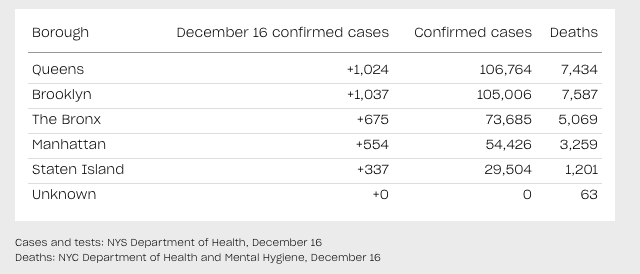
Hospitals in the borough are filling up at an alarming rate, with New York Presbyterian Brooklyn Methodist Hospital at 121% of its I.C.U capacity, Interfaith Medical Center at 97%, Brookdale Hospital Medical Center at 95%, Kingsbrook Jewish Medical Center at 80% and University Hospital of Brooklyn at 78%.
Black and Brown communities continue to be disproportionately affected by the virus, in both infection and fatality rates.

Other news in Brooklyn included:
- Brooklyn Hospital ICUs Near-Full With Coronavirus Patients: Data
- Documentary Chronicles Filmmaker's Coronavirus Mission to Help the Homeless
- Mobile Coronavirus Testing Available At Bed-Stuy's Marcy Houses
- Five Brooklyn Nonprofits Receive More Than $1M in Grants to Combat Effects of COVID-19, Climate Change and Election Issues
- One-Fifth of Montague Street Storefronts Empty Amid COVID Crisis
- Co-Ops in the Time of Covid
- Here's Where to Get a COVID Test Without Waiting for Hours
- New York's Restaurant Workers Grapple With the Crushing Mental and Physical Toll of COVID
Brooklyn Borough President COVID-19: A Rundown and Review
Brooklyn BP Eric Adams is asking all Brooklynites to remain vigilant in fighting the virus with, "determination, common purpose, and love — for our families, friends, communities, and our city."
His office has composed a list of resources for those in Brooklyn seeking help and assistance through the pandemic.
Updates And Important Information:
EDUCATION
- From November 2nd through November 15th families can fill out a form to indicate if they are interested in and planning on returning to a blended model for their child/children. The first in-person day for these students will be during the weeks of November 30th and December 7th. For more information click here.
- Learning Bridges offers no-cost preschool and school age child care options for children from 3-K through eighth grade on days when they are scheduled for remote learning. Click here to learn more.
- Brooklyn Museum's "Youth Tours: Art at Two" offers virtual programming for children ages five through 10. Click here for more information.
- "Let's Learn NYC!" is an educational public television program produced by the WNET Group in partnership with the New York City Department of Education (DOE), features lessons for children in 3K through second grade that will supplement remote learning. More information can be found here.
- NYC, which is powered by the New York City Economic Development Corporation (EDC), released a downloadable guide for free and low-cost tech courses in New York City.
HEALTH
- Governor Cuomo released details on the metrics regarding COVID-19 micro-clusters.
- Red Zone — Micro-Cluster: A "Red Zone" focus area is put in place to contain spread from a specific, defined geographic area.
- Orange Zone — Warning/Buffer: An Orange Zone area either is put in place primarily in densely populated urban areas as a tight buffer zone around a Red Zone micro-cluster ("Orange Buffer Zone") area OR is implemented independently as a focus area based on the below metrics ("Orange Warning Zone"). The purpose of an Orange Buffer Zone is to 1) restrict activity to prevent further spread from Red Zone area; 2) provide a defined geographic area where metrics can be monitored daily to ensure COVID is not spreading beyond the Red Zone.
- Yellow Zone — Precautionary/Buffer: A "Yellow Zone" area either is put in place as a broader buffer area to ensure COVID outbreak is not spreading into the broader community ("Yellow Buffer Zone") OR is implemented independently based on the below metrics ("Yellow Precautionary Zone"). The purpose of a Yellow Buffer Zone is to 1) restrict some activity to help prevent further spread from Red and/or Orange Warning Zone area; 2) provide a larger defined geographic area where metrics can be monitored daily to ensure COVID is not spreading beyond the Red Zone or Orange Warning Zone.
- For more details click here.
- The Mayor's Office released an interactive map of closure zones in parts of Brooklyn and Queens due to a spike in COVID-19 cases. The map allows businesses and residents to look up what zone they're in and what closures impact them. To view the map, click here.
- Free tele-support group services are available with Lighthouse Guild Family Service Network. For young adults with vision loss, click here. For adults with vision loss, click here. For all questions, call (212) 769-7833.
- COVID-19 testing has been made available to all New Yorkers. COVID-19 testing sites are available in your area with new ones being added on an ongoing basis. To find the one nearest you, visit the state website [New York State Department of Health (NYSDOH) website], the City's website [New York City's COVID-19 Information Portal], or type "COVID testing near me" in Google Maps.
- Crisis Text Line has support resources and counselors available for free 24/7 for frontline and essential workers. Text NYFRONTLINE to 741-741 to be connected, or visit crisistextline.org.
- Mayor de Blasio announced an emergency financial relief program for survivors of domestic and gender-based violence to provide funding for immediate safety, economic, and housing needs currently exacerbated by the COVID-19 pandemic. Helpful resources that are currently available include the agency website, the "NYC HOPE" resource directory, and the Resources for Survivors During COVID-19
- Worried about having to self-isolate in a dangerous home situation? Co-quarantined with an abuser? Please reach out and contact the National Domestic Violence Hotline. Call 1 (800) 799-7233, TTY 1 (800) 787-3224, or chat online at org.
- If you need mental health support, the New York Emotional Support Hotline is (844) 863-9314.
- The New York Peace Institute has online resourcesto mitigate stress with tools such as meditation.
- Use telemedicine services BEFORE going to the doctor's office, urgent care, or the ER. Call (800) 633-4227 or your doctor for more information if you are on Medicaid. Whether you utilize Medicaid, private insurance, or are a self-payer, options are offered across many specialty areas. Urgent care telemedicine is available with New York-Presbyterian, Mount Sinai, or NYU Langone. Mental health telemedicine is available with Columbia Doctors. Diabetes telemedicine help is available with NYC Health + Hospitals. If you know other services, email askeric@brooklynbp.nyc.gov.
FINANCIAL SUPPORT
- The Internal Revenue Service (IRS) extendedits deadline to register for an Economic Impact Payment (EIP) to November 21, 2020. This new date will provide an additional five weeks beyond the original deadline. This extension is solely for those who have not received their EIP and do not normally file a tax return.
- Mayor de Blasio announced the free "MEND NYC" program to provide mediation to New Yorkers and hospitality businesses across the city who are in disputes over quality-of-life issues. Mayor de Blasio recently expanded eligibility to neighbor disputes and landlord/commercial tenant disputes.
- New York State is offering an additional 20 weeks of unemployment benefits. Visit ny.govto see if you qualify.
- Distribution sites for small businesses looking to obtain face coverings, are open. Visit gov/businessfor more information across the boroughs.
- The New York City Department of Small Business Services (SBS) has published plain language industry guides as a tool for small businesses to adhere to the latest mandatory guidance and to share best practices. Visit gov/businessfor more information on the guides.
- Unemployed New Yorkers can access support at the New York State Bar Association (NYSBA)'s new website, org/legalhelp, which was set up to provide resources for filing an unemployment claim. If needed, NYSBA will match people with a pro bono attorney.
- The Brooklyn Chamber of Commerce has launched the Bring Back Brooklyn Fund to support small businesses that have been shut out of other COVID-19-related loan programs, with 65 percent earmarked for minority and/or women-owned business enterprises (MWBE). The Bring Back Brooklyn Fund will offer no-interest recovery loans between $500 and $30,000. You can contribute to the effort here.
- The New York Legal Assistance Group (NYLAG) launched the NY COVID-19 Legal Resource Hotline to help New York City residents impacted by COVID-19 get answers to their legal questions on issues including unemployment benefits, employee rights, housing, public benefits, consumer debt, advance planning, stimulus payments, and special education issues. Call (929) 356-9582 Monday-Friday 10:00 AM to 1:00 PM to leave a message with your name and contact information or visit org/hotlinefor more information.
- DCWP's Office of Financial Empowerment has transitioned all financial counseling and coaching programs to offer services remotely. Book an appointment here.
FOOD PANTRY/FOOD ASSISTANCE
- The New York City Department of Buildings (DOB) released indoor dining guidelines that can be found by clicking here.
- The Mayor's Office released guidance to heat outdoor dining spaces for restaurants participating in the Open Restaurants program.
- Electric radiant heaters will be allowed for sidewalk and roadway seating setups. For full guidance from the New York City Department of Buildings (DOB), click here.
- Natural gas radiant heaters will be allowed on the sidewalk only. For full guidance from DOB, click here. Natural gas radiant heaters must also comply with the Fire Code.
- Portable heaters fueled by propane will also only be allowed on the sidewalk. Propane heating will be regulated by the New York City Fire Department (FDNY), with requirements for safe handling, use and storage. For full guidance from the FDNY, click here.
- All students who would have received a free or reduced-price meal at school are now eligible for additional food assistance through Pandemic Electronic Benefits Transfer (P-EBT). This includes undocumented students, students whose private schools participate in the National School Lunch Program, and students in districts that implement the Community Eligibility Provision (CEP). New York City families will receive an additional $5.70 for every day school has been closed to purchase foods available through the Supplemental Nutrition Assistance Program (SNAP).
- School sites are open for grab-and-go meals from 9:00 AM to 12:00 PM, outside of main entrances of every school building. The program is now open to anyone who wants food, no questions asked. Go to nyc.gov, or text "FOOD" or "COMIDA" to 877-877 for lists of where meals are being served. Breakfast and lunch will be distributed from 3:00 PM to 5:00 PM in select schools at over 200 locations as the program moves toward an after-school schedule.
- New Yorkers can use their SNAP benefits to order online.
- The City has streamlined the home delivery of meals to seniors and is working to support our food pantries, which are critical partners in these efforts. In the interim, you can find a list of key resources at gov/GetFoodor by calling 311 and saying "Get Food."
- Hunter College New York City Food Policy Center has partnered with Share Meals, Hunger Free America, BetaNYC, and Plentiful to compile a listing and guide on food resources available to New Yorkers.
GENERAL
- The Civic Engagement Commission officially launched its poll interpretation website, which details their poll site interpretation program, lists all voting sites where CEC interpreters will be assisting voters, and has a "Know Your Rights" section. Visit the site by going to gov/wearevoters.
- NYC Parks has resumed permitting its athletic fields across the city for outdoor youth sports. Supportive of children's physical and mental health, lower- and moderate-risk youth play on permitted fields has also resumed. They will continue to allow sports activity of low-to-moderate-risk on courts and fields across the city on a first-come, first-served basis, in accordance with the State's reopening guidelines for sports and recreation.
- Mayor de Blasio announced COVID-19 traveler registration checkpoints into New York City to ensure compliance with New York State quarantine requirements. Travelers who have visited 41 designated states or territories with high COVID-19 transmission rates are required to complete the New York State Department of Health traveler formand quarantine for a period of 14 days upon entering New York City.
- The New York State Department of Motor Vehicles (DMV) will only offer services in person by reservation for limited transactions that cannot be done online or by mail or drop box. You can make reservations at ny.gov/reservation.
- Visit NYCfor information on groups and individuals working on mutual aid in their communities, as well as if you need help or can help.
- Free and low-cost childcare options during the COVID-19 crisis are available through Workers Need Childcare, for parents and caregivers in New York City's essential workforce.
- For veterans and their families, the NYC Veterans Alliance has a list of resources on their website.
- Twenty-two branches of the New York Public Library, Brooklyn Public Library, and Queens Public library are open with Grab-and-Go services.
HOUSING
- Utilities have been ordered to not shut off service for gas, water, or electricity. Internet services will not be cut off during this time.
- For New Yorkers requiring quarantine or isolation, NYC Health + Hospitals is offering free hotel rooms for up to 14 days if there is a need for a place to isolate. Call (844) NYC-4NYC (844-692-4692) and press "0".
- National Grid customers should be aware of a phone scam demanding immediate bill payment and threatening service disconnection. Learn ways to protect yourself and your family here.
TRANSPORTATION
- The MTA launched a new interactive beta digital map to allow riders to plan their trips and see real time alerts. To view the map click here.
- There is currently no subway service from 1:00 AM to 5:00 AM to allow for cleaning and disinfecting of trains and stations. The "MTA Overnight" pageprovides details on the service changes.
For City alerts in English, text COVID to 692-692.
For City alerts in Spanish, text COVIDESP to 692-692.

